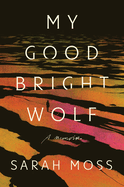
Sarah Moss's rigorous, innovative memoir, My Good Bright Wolf, is about creating safety for a body embattled by disordered eating and competing voices.
As a novelist, Moss (Ghost Wall) exhibits compassionate attention and perspective--skills she applies autobiographically here. Her second- and third-person narration emphasizes the contrast between her thinking self and troublesome flesh. Growing up with an angry father (whom Moss calls "the Owl") and judgmental mother ("the Jumbly Girl") who praised her for losing weight, Moss knew she must stay small and never be high-strung. She adhered to an ever-stricter diet, yet her appetite for books remained voracious. Moss casts a critical eye over the literature of her childhood, which preached self-denial, encouraged independent exploration, and often depicted food in problematic ways. After eight years with anorexia, though, it seemed reading might prove Moss's salvation: Naomi Wolf's The Beauty Myth galvanized her to "change the world rather than your body."
However, the memoir constantly questions such easy conclusions. It bears privilege in mind, interrogates memories of abuse via an imagined critic ("If you believe this rubbish you're crazy and if you don't you're a liar"), and undermines rosy recovery narratives: a relapse landed Moss in the emergency room in midlife. Still, she is steadfast in the face of setbacks. The fairy tale wolf, stripped of its menace, is her familiar, a comforting messenger to her younger self. Feisty and original, this feminist text exhorts self and readers alike to "befriend your body." --Rebecca Foster, freelance reviewer, proofreader and blogger at Bookish Beck

